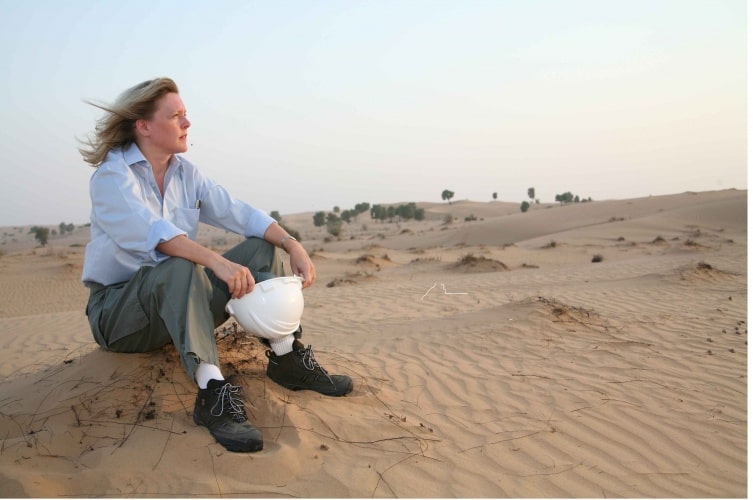According to a recent survey by NES Global Talent, three-quarters of women working in the oil and gas sector say they feel welcome in the industry. Despite this 45%[1> still believe they don’t receive the same recognition as men.

Shell was recently named in The Times Top 50 Employers for Women 2015, which lists the organisations that are leading on workplace gender equality. Shell was the only oil and gas company to feature on the list, alongside heavyweights from industries such as financial services and engineering consulting.
Trui Hebbelinck, Vice President for UK Human Resources at Shell, credits The Times Top 50 recognition to the hard work the company has done on senior leadership accountability, flexible working, parental coaching and promoting more women into leadership positions. She believes Shell has embarked on a step-change addressing the gender challenge in energy roles.
‘We want the diversity of our workforce to mirror that of our customers and the communities we work in,’ she said. ‘Recognition like this demonstrates that we give everyone a chance to succeed in our company.’ In particular, judges said Shell scored highly on how it includes diversity into its roles, for its fair and transparent pay processes, as well as the impact our gender policies have on individuals and performance culture.

‘There is a lot of focus on people in general,’ said Britt Burnett, global pricing, planning and portfolio manager at Shell. ‘Be it on people development or diversity and inclusiveness. I joined Shell from the world of finance, where there was none of that. As an employer, the company shows a lot of trust in its employees and allows for a lot of flexibility in ways of working, which help men and women alike.’
There is a lot of focus on people in general. Be it on people development or diversity and inclusiveness
Britt Burnett, global pricing, planning and portfolio manager at Shell
This isn’t just at engineer level, but also in senior management. For instance, Ceri Powell, Shell’s Executive Vice President Exploration, Shell Upstream International, has enjoyed a remarkable rise to the top of the company. As one of the most senior women in energy today, she is an example of how Shell nurtures talent, regardless of gender. ‘I hope that my achievement is an inspiration for young technical female professionals looking to achieve the hallmarks of excellence in their careers,’ she said.
Powell was recently featured on Fortune Magazine’s Most Powerful Women list, rising eight places to number 21 on the 2014 list, from her inaugural 29th placing in 2013. She joined Shell in 1990, and has since worked in the UK, Angola, Malaysia, the Netherlands and the United Arab Emirates. Among her roles, she has been the Executive Vice President Exploration, Shell Upstream International since 2009, and in 2013 her role was expanded to Global Functional Head of Exploration.

Powell believes that one day, the energy industry will be a gender-free profession. ‘The energy business is constantly pushing boundaries, whether it is technologies, new harsh locations, or partnerships with new stakeholders,’ she said. ‘Being a woman can be a powerful element in working in these new environments and with these new stakeholders. Do not shy away from the challenge. Remember the women who are coming behind you.’
Being a woman can be a powerful element in working in these new environments and with these new stakeholders. Do not shy away from the challenge. Remember the women who are coming behind you.
Ceri Powell
Growing up in Pembrokeshire in southern Wales – an area with stunning geology along the sea cliffs – inspired Powell to study geology at the University of Liverpool. This was followed by a Shell-sponsored PhD in structural geology, before she was offered a position at the company. Here, she was encouraged to get involved in various projects outside her day-to-day role, allowing her to get a good grounding in energy early on in her career.
‘This industry allows young staff to make a difference, enabling both the organisation and the young graduate to generate value,’ said Powell. ‘As a young technical professional, there is also a range of jobs that can suit the individual’s skill set, meaning that the young person can be exposed to a wide- range of challenges. This may also be true of other industries but is definitely the case in the energy business.’
Shell is constantly looking for remarkable people to join its team. The company values employees who are curious, passionate and excited to explore the ideas and technology that will shape the future – regardless of gender. To learn more about careers visit www.shell.co.uk/careers/experienced-professionals/technical-careers . To search for a vacancy, take a look at www.shell.com/global/aboutshell/careers/professionals/job-search2 .
[1> According to a recent survey by NES Global Talent

Red Bull makes hydrogen fuel cell play with AVL
Formula 1 is an anachronistic anomaly where its only cutting edge is in engine development. The rules prohibit any real innovation and there would be...